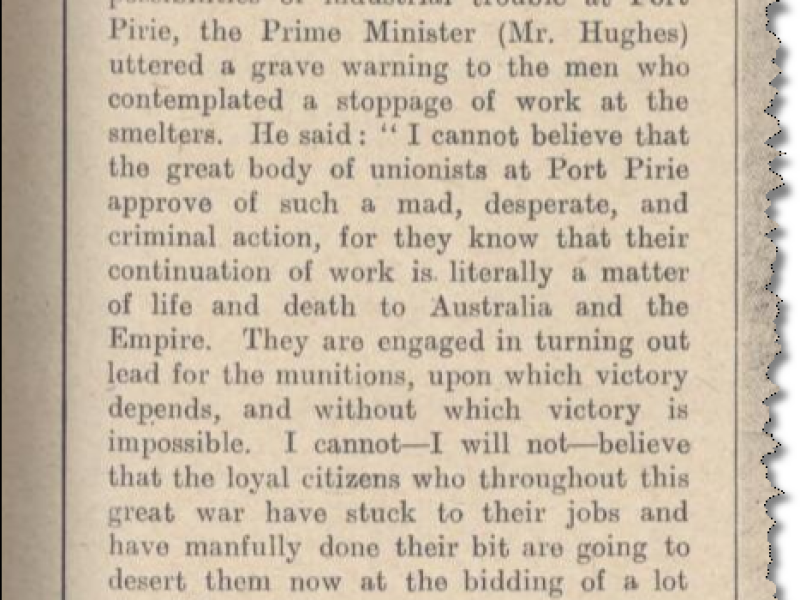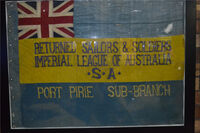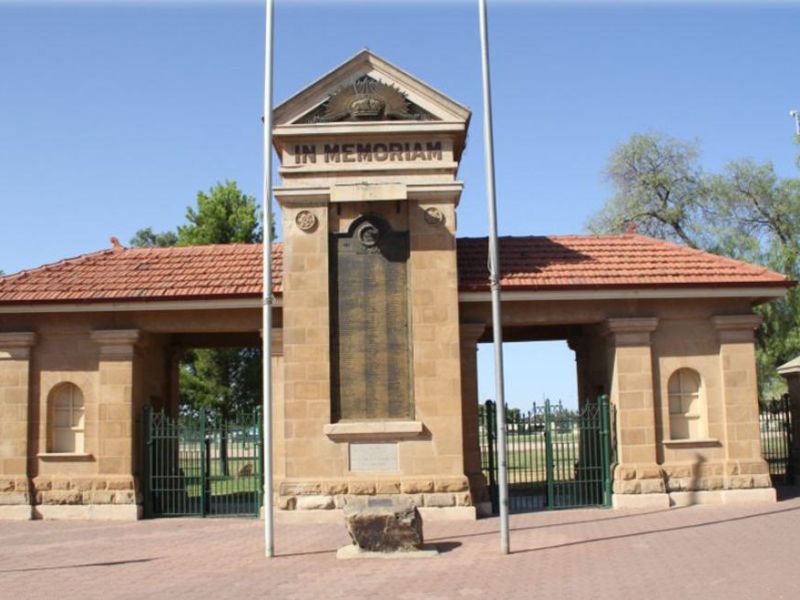No Lead – No Beer
Under the War Precautions Regulations 1915-1918 the federal government progressively expanded its powers over the prosecution of the war on the 'home front', including, on the 19th May 1915, the regulation of licensed premises and control of the supply of liquor; and on the 17th February 1916, the specific power to close licensed premises.
On the 28th May 1917 an Executive Order transferred authority under the War Precautions Regulations from the Minister of Defence to the Military District Commandants and vested them with discretionary power to close all licensed premises within a prescribed area such as a munitions works; or upon the arrival or departure of troop or other military transports or hospital ships at most Australian ports.
At that time, the continuity of the supply of lead for the Allies was of paramount importance. Threatening strike developments in Port Pirie was feared, for the Barrier (Broken Hill) men were on strike, and were making desperate efforts to get the Pirie men out.
Mr. Jethro Brown of the State Industrial Court, had been sent up to address the Pirie men, but he was merely laughed at.
Although the military authorities ordered individual hotels such as the Black Swan, North Terrace, Adelaide to close as early as the 14th July 1917, the power to close all pubs under the War Precautions (Liquor) Regulations was first exercised in Port Pirie, South Australia on Saturday the 25th August 1917.
A notice on one of the big stacks at the Smelters stated “Get a Union Badge or Get Out”. This was soon obliterated to read: “No Lead, No Beer.”
Soon after midday the Inspector of Police (Mr. J. Holland) received instructions from the Federal authorities to warn all hotelkeepers that all hotels in Port Pirie must be closed forthwith and remain so until further notice. This action gives power to, if necessary, close all hotels in munitions areas during the period of the war. The hotels were notified at about 12.30 p.m., and all bars were immediately shut up.
Strangely enough, the out-license vendors were overlooked for a while, and for more than half an hour they made a welter of it, substantially reducing their stocks. As soon as the Central Hotel bar was closed there was a rush to a neighbouring wine and spirit saloon for bottled stuff, and many men came out with various quantities of liquor.
One man was seen to emerge with a sugar bag half filled. It was only a few minutes, however, before the police called at the establishment, and, like the hotels, it was closed. One group of men stood in the middle of the road outside the Central Hotel and passed round a bottle, taking swig for swig.
Women coming to the stores remarked that it was the first time they had received practically their husbands' full salary, and they wish they would remain closed forever. Farmers coming in from the country to do business said that everything was so quiet that when they passed the hotels, they thought it must have been Sunday.
On Tuesday the 4th September 1917 the secretary of the Port Pirie Hotel-keepers' Association telegraphed to Mr. Poynton, Member of the House of Representatives, requesting him to approach the Prime Minister and point out that a largely signed petition urging the re-opening of hotels had been prepared. The question as to whether licensees would be compensated was also put.
On Monday the 10th September 1917, a storekeeper in Alexander Street being the holder of a licence for the sale of intoxicating liquor, was fined £40 for selling brandy to a Greek who was coming away from the premises with a sugar bag, which, on investigation, was found to contain liquor.
The hotels of Port Pirie were reopened shortly after midday on Friday the 14th September 1917; and despite the fact that shipping trade was dull, and consequently wharf labourers' earnings curtailed, there was a big rush for the bars at the reopening.
It must not be inferred by any means that the "thirsty souls" of Port Pirie were confined to the wharf labourers. There were others who deprecated prohibition quite as strongly as did the men who earn their bread and butter along the waterfront.
Men were soon talking and arguing in all the bars, and some were singing maudlin tunes; but that to these misguided men, and even some of the broadminded politicians, represents "life".

 RSL (Port Pirie Sub Branch) Inc.
RSL (Port Pirie Sub Branch) Inc.